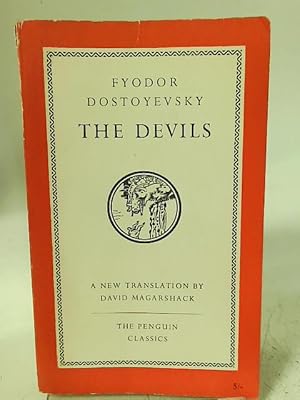


Nabokov, admittedly wishing to shock his Cornell students into reading the novel, called “Demons” “grand booming nonsense with flashes of genius. Some Russians condemn it-and him with it. Russian though he was, he came largely out of the early 19th-Century French urban ecole frenetique, and his diction tends to have a frenetic quality about it. Each of the ideas has a voice very much its own, the voice of the character who professes and to some extent personifies it.ĭostoevsky’s style has long been a bone of contention. What makes the novel prophetic, however, is not so much how closely Dostoevsky’s ideas approximate their 20th-Century counterparts as how deadly he makes any idea that assumes absolute priority. Now that Russia has renounced its ideology it is being read with a vengeance: “Demons” tells Russia’s story in microcosm, and in advance. Dostoevsky could not be published at all in the Soviet Union during the Stalinist years, and even in the relatively liberal post-Stalinist period this novel remained taboo and thus virtually unavailable in popular editions. Millions and millions of ideologically rationalized murders later, it is infinitely more timely.

At the time it appeared in Russia, it could be read as the other sort of “key novel,” a roman a clef, based as it was on the ideologically rationalized murder of a party member who had strayed from the fold. “Demons” is the Dostoevsky novel for our age in fact, it is a key novel as such for an age that has come to recognize the evils of ideology-any ideology.

There is also a perfectly good Russian word for devils, and it is not the word Dostoevsky chose to use. Had Dostoevsky wanted to name this work “The Possessed,” he could easily have done so, Russian having an exact equivalent. The Russian word means evil spirits, not the people possessed by them. Do we need a fifth? Given the quality of the Pevear-Volokhonsky translation, the answer is most definitely yes. A more recent translator, Andrew MacAndrew, has kept it two others, David Magarshack and Michael Katz, have-independently-called the work “The Devils.” All four versions are currently in print. “Demons,” first published in 1871-72, and Dostoevsky’s last major novel before “The Brothers Karamazov,” is the work we have commonly known in English as “The Possessed.” Such is the title Constance Garnett gave to her translation of the novel (its first, though it came out more than 40 years after the original). No, a new Dostoevsky novel has not been discovered.


 0 kommentar(er)
0 kommentar(er)
